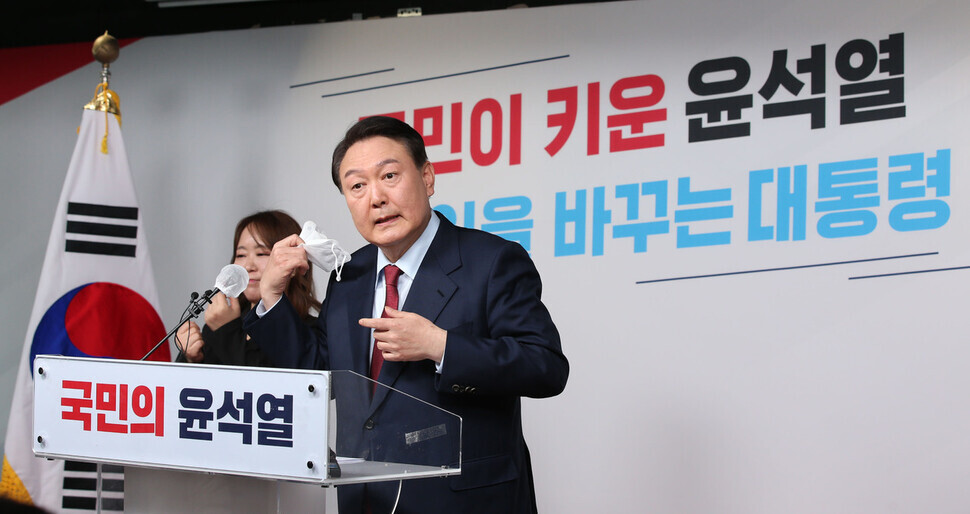hankyoreh
Links to other country sites 다른 나라 사이트 링크
Yoon under fire for pledging to bolster prosecutors’ authority

People Power Party (PPP) presidential nominee Yoon Suk-yeol laid out his pledges for judicial reforms on Monday. They included broadening prosecutorial authority to investigate high-ranking public officials, guaranteeing prosecutors authority to independently assign its own budget, and doing away with the minister of justice’s authority to direct investigations into the prosecutor general.
It’s a promise to drastically increase prosecutorial authority, coming from a candidate and former prosecutor general who has ignited controversy with his references to investigations aimed at “eradicating deep-rooted vices” in the current administration — something critics have described as “political retaliation.”
Yoon’s announcement of his pledges for the judicial system was made at the PPP headquarters in Seoul’s Yeouido neighborhood on Monday.
Announcing plans to “reform” the Corruption Investigation Office for High-ranking Officials, or CIO, Yoon said he intended to “get rid of the toxic provisions that assign the CIO a dominant and monopolistic position, and make it so that not only the CIO but also the prosecutors and police can investigate corruption by high-ranking officials.”
Under the current law, the CIO has priority authority to investigate crimes of corruption involving the president, members of the National Assembly, the Supreme Court chief justice, the prosecutor general, various Cabinet ministers and vice ministers, judges and prosecutors.
Yoon was signaling his intent to take away the CIO’s monopoly on investigations and beef up the prosecutors’ authority to conduct their own.
Yoon even alluded to the possibility of abolishing the CIO altogether.
“The state’s ability to remedy corruption involving the abuse of power cannot function properly when the CIO is calling the shots with the police and prosecutors’ internal investigation intelligence,” he said.
“If the public has fundamental doubts about the CIO system, then I intend to work toward abolishing it,” he added.
Promising to guarantee the independence of prosecutors, Yoon said his plan was “to set up a system where the prosecutor general can request the Supreme Prosecutors’ Office’s budget each year from the Ministry of Economy and Finance, so that the SPO budget is drawn up separately from the Ministry of Justice.”
To ensure the neutrality of investigations, he also said he planned to abolish the minister of justice’s authority to direct investigations into the prosecutor general, saying that such authority “has been abused.”
The justice minister’s authority to direct investigations into prosecutor generals signifies “civilian control of prosecutorial authority.” Former Minister of Justice Choo Mi-ae invoked this authority six times to investigate then-Prosecutor General Yoon Suk-yeol’s family members and close aides, prompting backlash from prosecutors.
Yoon said he would “institutionalize investigation of police by police, and investigation of prosecutors by prosecutors.” He also pledged to significantly expand prosecutors’ investigative capacity — currently limited to cases related to corruption, the economy, public officials, elections, the defense industry, and large-scale disasters — then removed the promise from his platform following criticism that it would nullify the separation of investigative powers from prosecutors and the police.
The People’s Solidarity for Participatory Democracy released a statement on Yoon’s judicial platform that read, “A presidential candidate who formalized [South Korea] as a prosecutorial republic during his tenure as prosecutor general announced the revival of omnipotent prosecutorial authority.”
Lee Jae-geun, the director of the civic group’s judicial watchdog center, characterized Yoon’s judicial pledges as “promises of the prosecution, by the prosecution, and for the prosecution.”
By Kim Ga-yoon, staff reporter
Please direct questions or comments to [english@hani.co.kr]

Editorial・opinion
![[Editorial] Penalties for airing allegations against Korea’s first lady endanger free press [Editorial] Penalties for airing allegations against Korea’s first lady endanger free press](https://flexible.img.hani.co.kr/flexible/normal/500/300/imgdb/original/2024/0502/1817146398095106.jpg) [Editorial] Penalties for airing allegations against Korea’s first lady endanger free press
[Editorial] Penalties for airing allegations against Korea’s first lady endanger free press![[Editorial] Yoon must halt procurement of SM-3 interceptor missiles [Editorial] Yoon must halt procurement of SM-3 interceptor missiles](https://flexible.img.hani.co.kr/flexible/normal/500/300/imgdb/child/2024/0501/17145495551605_1717145495195344.jpg) [Editorial] Yoon must halt procurement of SM-3 interceptor missiles
[Editorial] Yoon must halt procurement of SM-3 interceptor missiles- [Guest essay] Maybe Korea’s rapid population decline is an opportunity, not a crisis
- [Column] Can Yoon steer diplomacy with Russia, China back on track?
- [Column] Season 2 of special prosecutor probe may be coming to Korea soon
- [Column] Park Geun-hye déjà vu in Yoon Suk-yeol
- [Editorial] New weight of N. Korea’s nuclear threats makes dialogue all the more urgent
- [Guest essay] The real reason Korea’s new right wants to dub Rhee a founding father
- [Column] ‘Choson’: Is it time we start referring to N. Korea in its own terms?
- [Editorial] Japan’s rewriting of history with Korea has gone too far
Most viewed articles
- 1Months and months of overdue wages are pushing migrant workers in Korea into debt
- 2Trump asks why US would defend Korea, hints at hiking Seoul’s defense cost burden
- 31 in 3 S. Korean security experts support nuclear armament, CSIS finds
- 4[Editorial] Yoon must halt procurement of SM-3 interceptor missiles
- 5Fruitless Yoon-Lee summit inflames partisan tensions in Korea
- 6[Guest essay] Maybe Korea’s rapid population decline is an opportunity, not a crisis
- 7[Editorial] Penalties for airing allegations against Korea’s first lady endanger free press
- 8Bills for Itaewon crush inquiry, special counsel probe into Marine’s death pass National Assembly
- 9[Column] Can Yoon steer diplomacy with Russia, China back on track?
- 10At heart of West’s handwringing over Chinese ‘overcapacity,’ a battle to lead key future industries